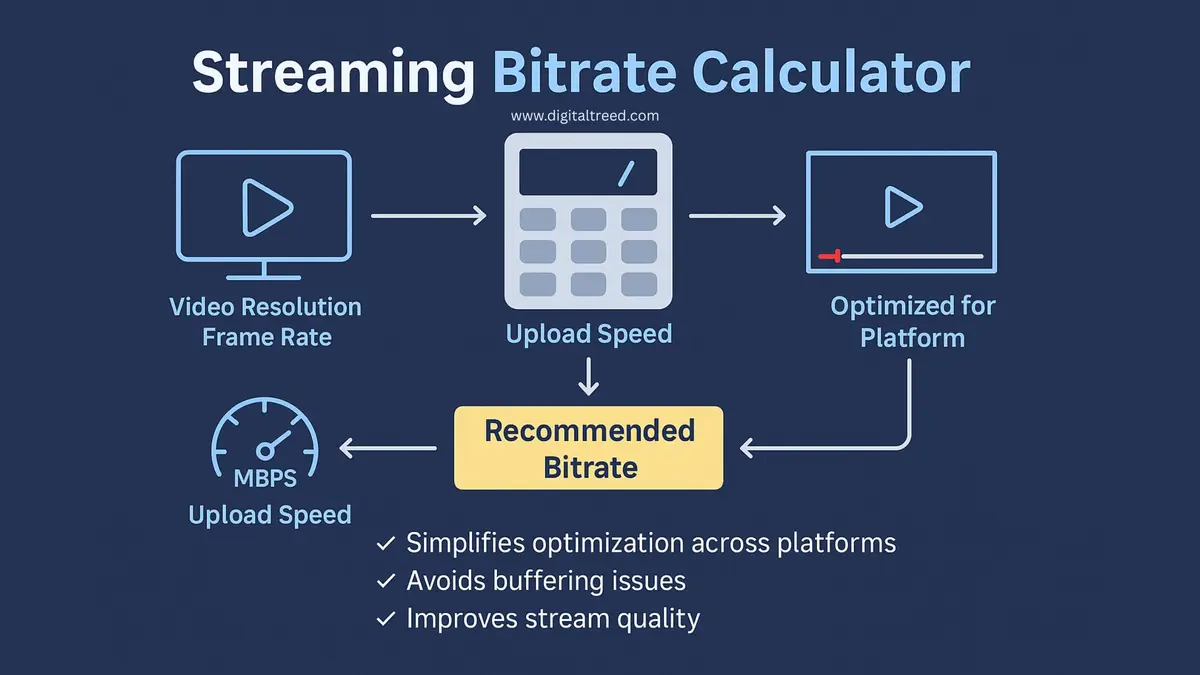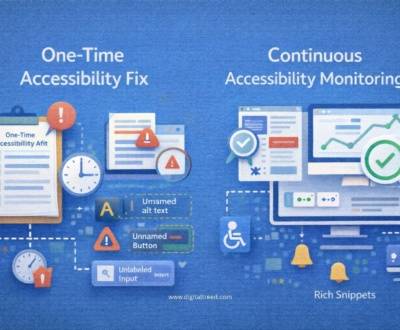How Does a Streaming Calculator for Bitrate Improve Your Live Quality? Essential Insights and Optimization Tips

- July 25, 2025
- Aijaz Alam
- Blogs
Streaming live video can be challenging, especially when trying to balance quality and smooth playback for viewers. A streaming calculator for bitrate helps creators find the best settings by analyzing factors like video resolution, frame rate, and upload speed, leading to a noticeably better live streaming experience. This tool takes the guesswork out of choosing the right bitrate, helping to avoid issues like buffering or pixelated images.
With the right streaming calculator bitrate settings, each stream is optimized for both the creator’s content and the platform they are using. Using an online bitrate calculator ensures that the stream matches the available internet speed and keeps the video looking crisp. Tools like a bitrate calculator let streamers make quick adjustments for different games, cameras, or internet conditions, so every broadcast looks its best.
Key Takeaways
- Calculators recommend the ideal bitrate for live streaming.
- They simplify optimizing stream quality across platforms.
- Proper settings help avoid buffering and quality loss.
How a Streaming Bitrate Calculator Enhances Live Streaming Quality
A streaming bitrate calculator helps streamers set optimal values for bitrate based on upload speed, video resolution, and frame rate. Using these tools leads to fewer technical problems and a smoother viewing experience.
Eliminating Buffering and Playback Interruptions
Buffering and playback stops are common problems during live streaming. This usually happens when the streaming bitrate is set too high for the available upload speed. A bitrate calculator matches the bitrate with the actual upload speed, measured in Mbps or Kbps.
With accurate settings, viewers see fewer pauses and less video freezing. The stream can play more smoothly, making it more enjoyable. Reducing buffering is especially important for game streams, webinars, and live events. Even a few seconds of lag can impact the whole experience.
By using a bitrate calculator, streamers can avoid overloading their internet connection. This makes it less likely they will lose viewers due to technical issues.
Achieving the Best Video and Audio Quality
Bitrate directly affects video and audio quality during a live stream. Setting the video bitrate too low can cause blurry or pixelated images. Good calculators can suggest bitrate settings for both video and audio based on the chosen resolution (such as 720p or 1080p) and frame rate (like 30fps or 60fps).
Here’s a quick reference table:
| Resolution | Frame Rate | Recommended Video Bitrate |
| 720p | 30fps | 3000 Kbps |
| 720p | 60fps | 4500 Kbps |
| 1080p | 30fps | 4500 Kbps |
| 1080p | 60fps | 6000 Kbps |
For audio, a range of 128 to 320 Kbps is often best. Calculators help users pick a balanced audio bitrate, so speech and music sound clear without using too much data.
Balancing Upload Speed with Streaming Performance
A well-balanced live stream uses as much upload speed as needed for quality, but not more. If the stream uses too much bandwidth, it can slow down other devices or make the connection unstable.
A bitrate calculator measures the user’s upload speed and subtracts some overhead, making sure streams do not overload the network. It recommends bitrates that fit within the available bandwidth, leaving room for background tasks and other internet uses.
Choosing the right bitrate also helps maintain consistent performance during long broadcasts. Streamers can avoid sudden drops in quality or lost connections, which can be common if network limits are ignored. This balance between speed and quality is key for professional-looking, reliable streams.
Optimizing Streaming Settings for Your Content and Platform
Getting the best stream quality depends on picking the right setup for your type of content and where you are streaming. Factors like resolution, frame rate, codec, and bitrate settings all play a major role in how clear and stable a live broadcast looks to viewers.
Setting the Right Resolution and Frame Rate
Selecting the correct video resolution and frame rate begins with understanding your content and audience needs. Fast-action games or sports benefit from higher frame rates like 60fps, which make motion appear smoother. For talk shows or slower scenes, 30fps may be enough.
A higher resolution, such as 1080p or 4K, provides more detail, but also requires increased bitrate and upload speed. Most content creators use 720p or 1080p because these give a good balance between clarity and bandwidth use. Higher resolutions, like 1440p and 4K, demand faster internet and are only useful if your platform supports them.
The table below summarizes typical settings:
| Resolution | Common FPS | Bitrate Recommendation (Kbps) |
| 720p | 30 / 60 | 3000 / 4500 |
| 1080p | 30 / 60 | 4500 / 6000 |
| 1440p | 60 | 9000 - 18000 |
| 4K | 30 / 60 | 13000 - 51000 |
Test your internet connection speed before choosing the highest settings available for your stream.
Choosing the Best Video Codec and Bitrate Mode
Selecting the right video codec can greatly affect video quality and compatibility. H.264 (AVC) is widely used because it works on nearly all platforms and devices. If supported, H.265 (HEVC) can deliver similar quality at lower bitrates but may not be compatible with every service or viewer device.
For bitrate control, two main modes are used: CBR (Constant Bitrate) and VBR (Variable Bitrate). CBR keeps the bitrate stable, which helps reduce buffering on platforms like Twitch and YouTube. VBR adjusts the bitrate based on content complexity, offering better quality for scenes with lots of detail, but might introduce short-term network instability if your connection is not fast enough.
Choosing suitable keyframe intervals (like 2 seconds) and proper audio bitrate settings (128-192 Kbps for most streams) also supports a clear broadcast.
Customizing Bitrate Recommendations for Target Platforms
Every streaming platform has its own optimal bitrate recommendations. For example, Twitch commonly suggests 3,000–6,000 Kbps for 1080p at 60fps, while YouTube allows higher bitrates for higher resolutions such as 4K. Facebook Gaming has similar recommendations to Twitch.
Content creators should always check the latest guidelines for their target platform before going live. Some platforms offer tools or calculators to analyze your upload speed, content type, and settings, then recommend the best bitrate for your situation.
Factors like stream duration, whether you stream action games or slower-paced content, and available internet speed should influence the final settings. This approach helps maintain video and audio quality while avoiding dropped frames or excessive buffering for viewers.
Conclusion
A streaming bitrate calculator helps users find the right balance between video quality and a stable stream. By using one, streamers can avoid common problems like lag, buffering, and dropped frames.
The tool takes into account important details such as upload speed, resolution, and frame rate. This means viewers get a smoother experience without the guesswork.
Benefits of Using a Bitrate Calculator:
- Matches bitrate to internet speed
- Optimizes video and audio quality
- Reduces buffering issues
- Makes setup faster and easier
Choosing the right bitrate settings with a calculator supports better content and a more reliable stream for viewers.
Aijaz Alam is a highly experienced digital marketing professional with over 10 years in the field. He is recognized as an author, trainer, and consultant, bringing a wealth of expertise to his work. Throughout his career, Aijaz has worked with companies such as Arena Animation (Aptech Ltd) and Matik Sports Private Limited. He previously operated a successful digital marketing website, Whatadigital.com, where he served an impressive roster of Fortune 250 companies. Currently, Aijaz is the proud founder and CEO of Digitaltreed.com.

About us and this blog
We are a digital marketing company with a focus on helping our customers achieve great results across several key areas.
Request a free quote
We offer professional SEO services that help websites increase their organic search score drastically in order to compete for the highest rankings even when it comes to highly competitive keywords.








